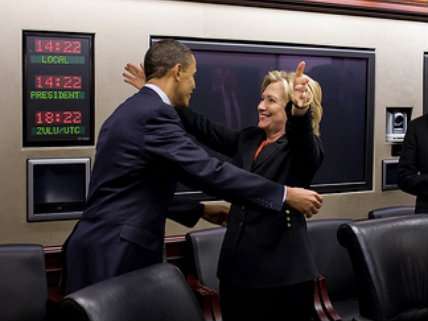The 2014 Midterm Was an Anti-Obama Election. That's Bad News for Hillary Clinton.

It's hard to avoid the conclusion that last night's midterm election was a referendum on President Obama. Republicans in nearly every close race made opposition to President Obama issue number one. Exit poll and pre-election surveys make it clear that voters were dissatisfied with the economy and the president's job performance, and they cast their votes in protest of the president.
President Obama wasn't on the ballot, of course, but as he himself insisted last month, his policies were. Many of the incumbent Democrats up for a vote had voted heavily in support of the president's agenda. Democrats struggled mightily to distance themselves from Obama, but they could not escape his gravity. Governor's race losses in blue states like Maryland and Massachusetts, while less explicitly about Obama, further suggest the depth of the dissatisfaction with the Democratic message.
To put it another way: Voters didn't like Obama—and they took it out on his fellow Democrats.
That has to be worrying for Hillary Clinton. Because unless there's a dramatic change in voter sentiments about the president, the 2016 Democratic presidential nominee is likely to face similar headwinds.
Clinton has not yet announced that she is running for the Democratic nomination, but she is widely expected to run, and if and when she does, she will be the immediate frontrunner. But unless the political ground shifts in a way that makes the presidential race quite favorable to Democrats, Clinton, who served as Obama's secretary of state, will face the same Obama-related challenges that many Democrats faced this round.
Her history with the president and the Democratic party means she won't be able to run far away from the president in a way that is plausible. And yet she also won't be able to run aggressively on his achievements and legacy either.
Knowing Clinton, she'll likely attempt a tailored version of the strategy that Democrats in close races adopted this time around—positioning herself as separate from the president but not actively opposed to him. She'll highlight the parts of policies that are widely liked, but acknowledge that many need to be fixed, tweaked, or updated—while providing as few specifics as possible about what those specifics should be. Indeed, to some extent, this is already the approach that Clinton has taken, vaguely moving away from Obama in ways designed to cause as little real friction as possible. She'll be neither with Obama nor against him, emphasizing distance but not disagreement.
That awkward, fence-straddling approach led to some slightly ridiculous moments, and ultimately failed to work for Democrats in this year's midterm. It's not likely to work for Clinton (or any other Democratic nominee) in 2016 either.
Yes, President Obama's approval could change, but that would probably require the White House to change first. Don't expect that to happen. Despite the GOP tide, the administration has already dropped hints that it won't be making major adjustments to its approach.
In two years, of course, President Obama's second term will be ending, and Democrats already seem to be consoling themselves that he won't be a drag on the next election. His time will be over, and voters won't punish Democrats for his presidency. Tell that to John McCain. A two-term president can still hurt a party even on the way out, as Bush did in 2008. And if last night's anti-Obama Republican wave is any indication, the current president could hurt Democrats in the next election too.


Show Comments (337)